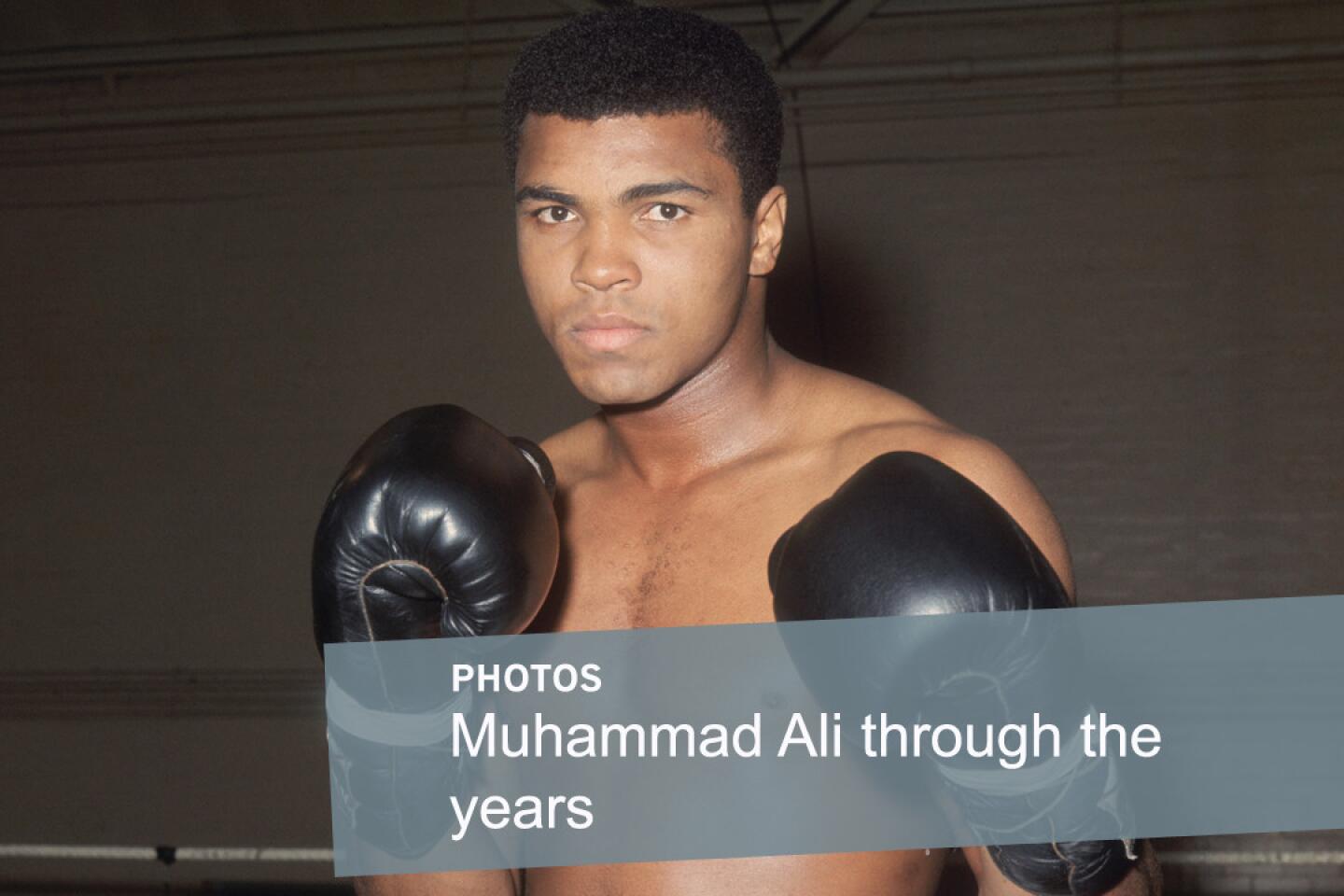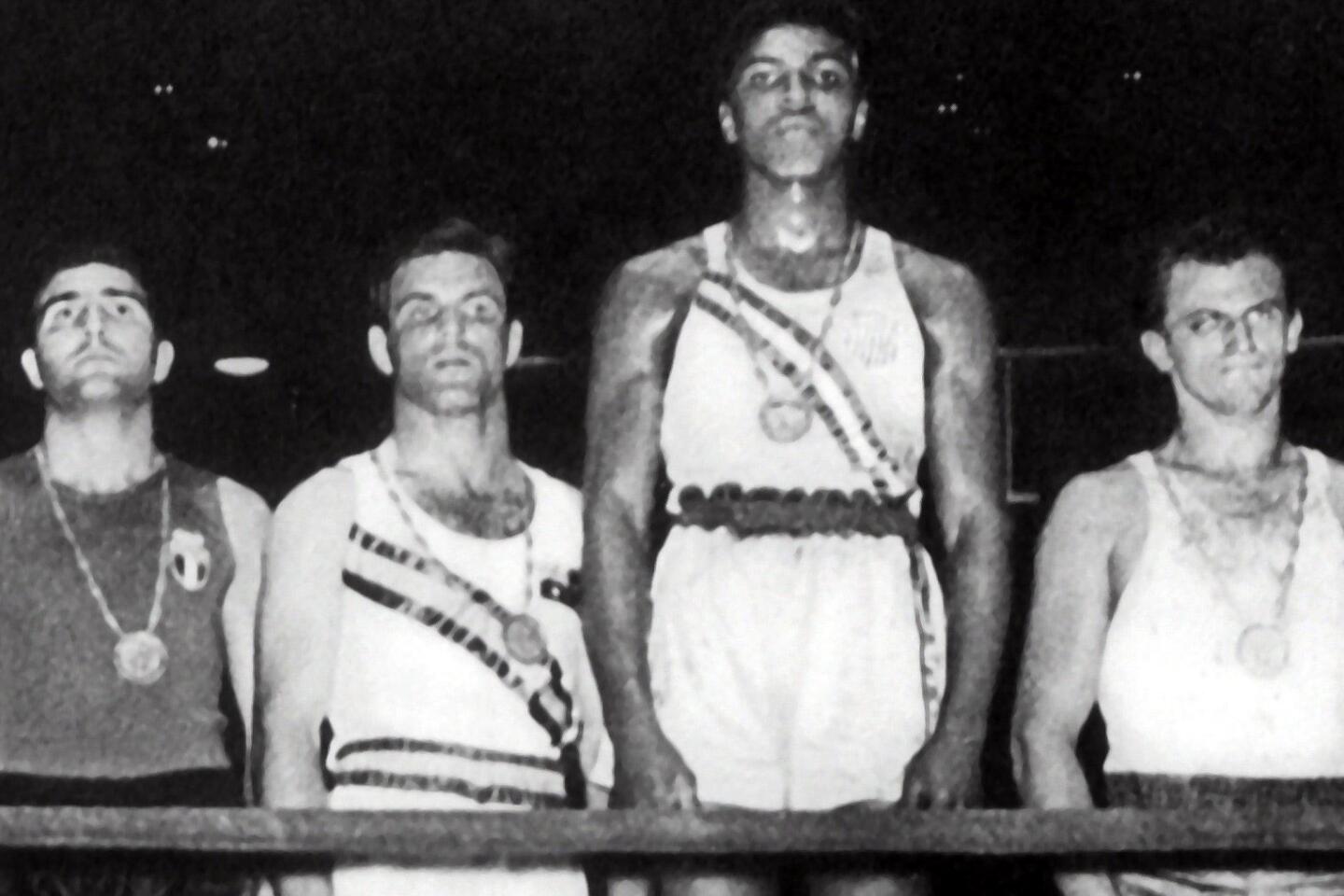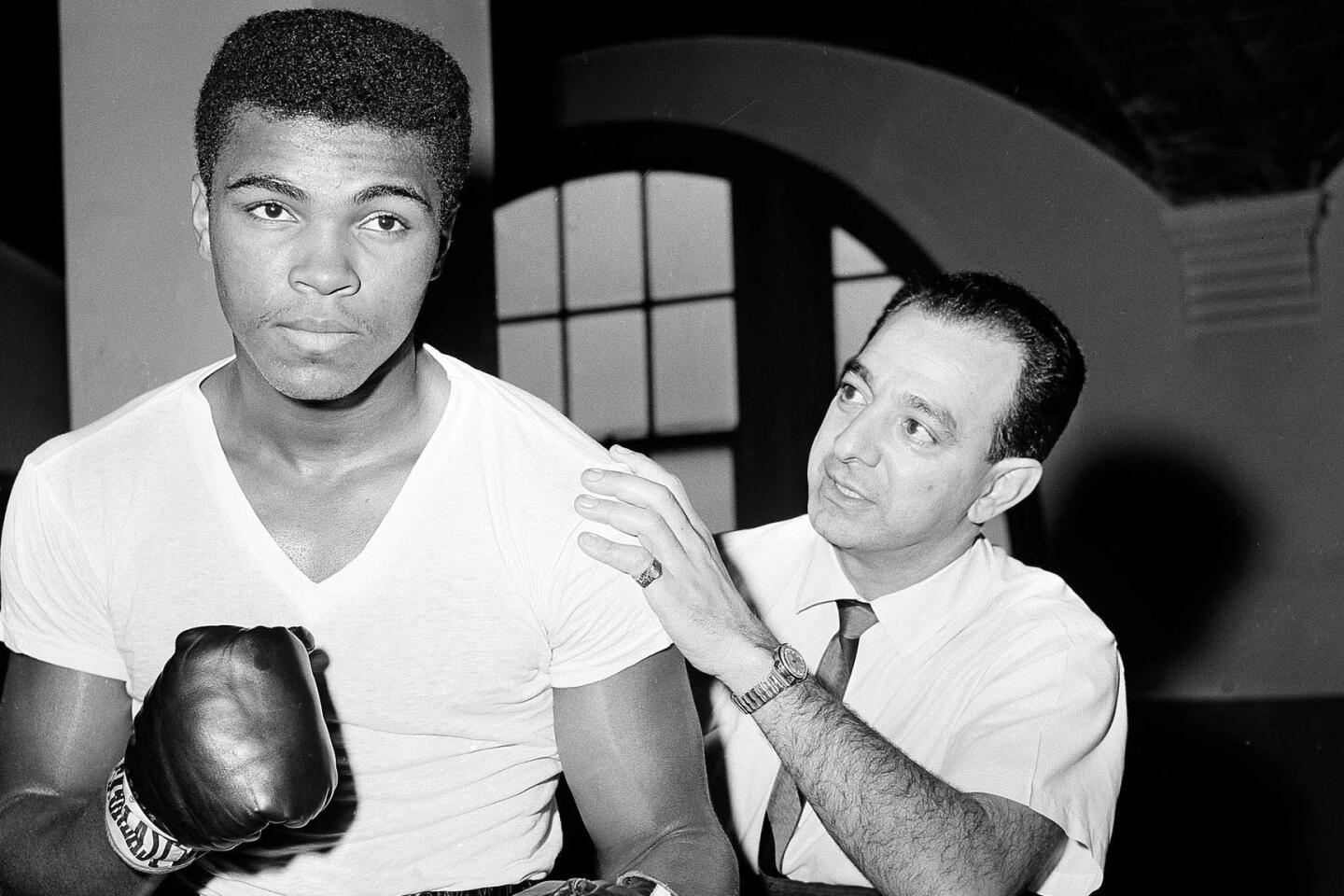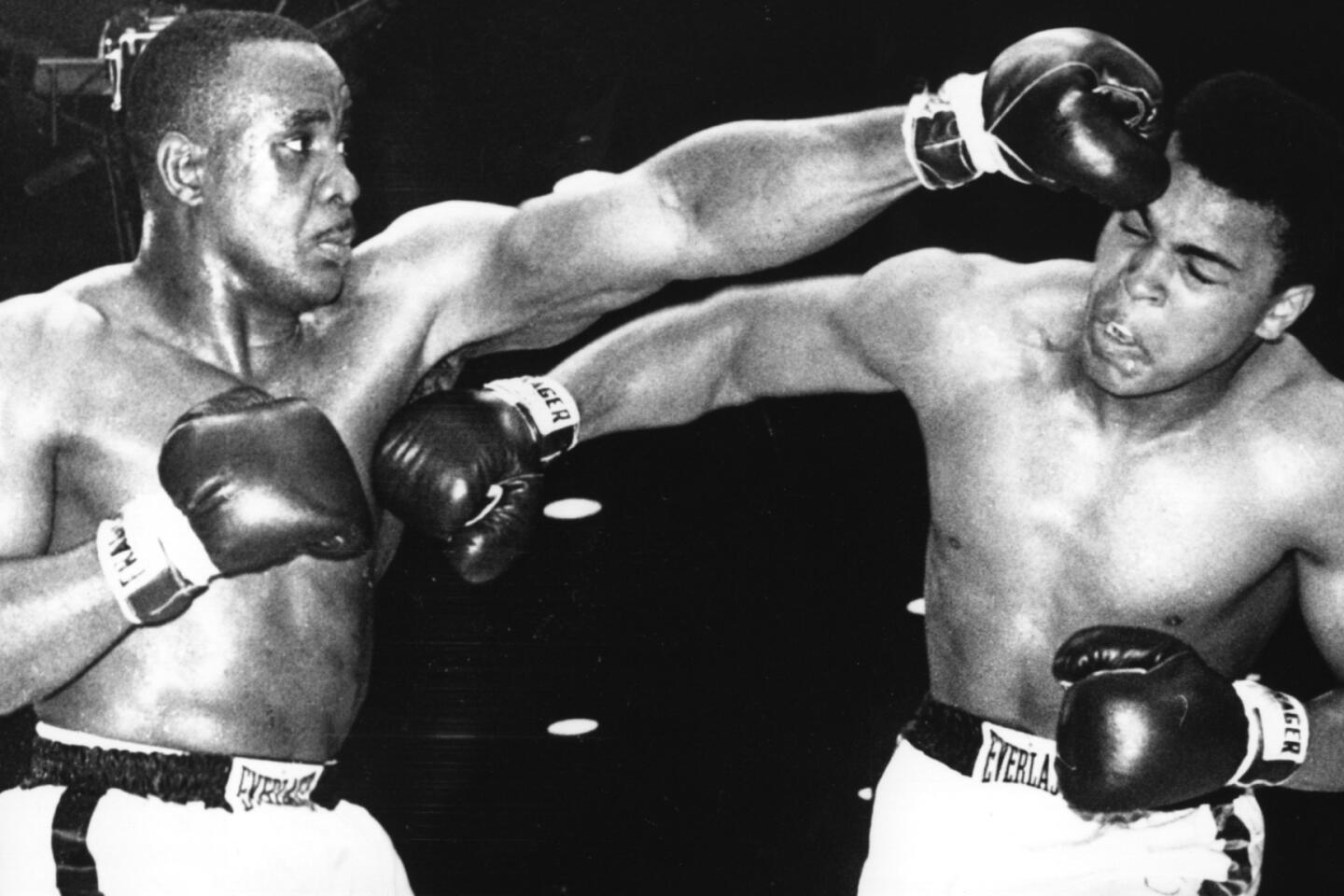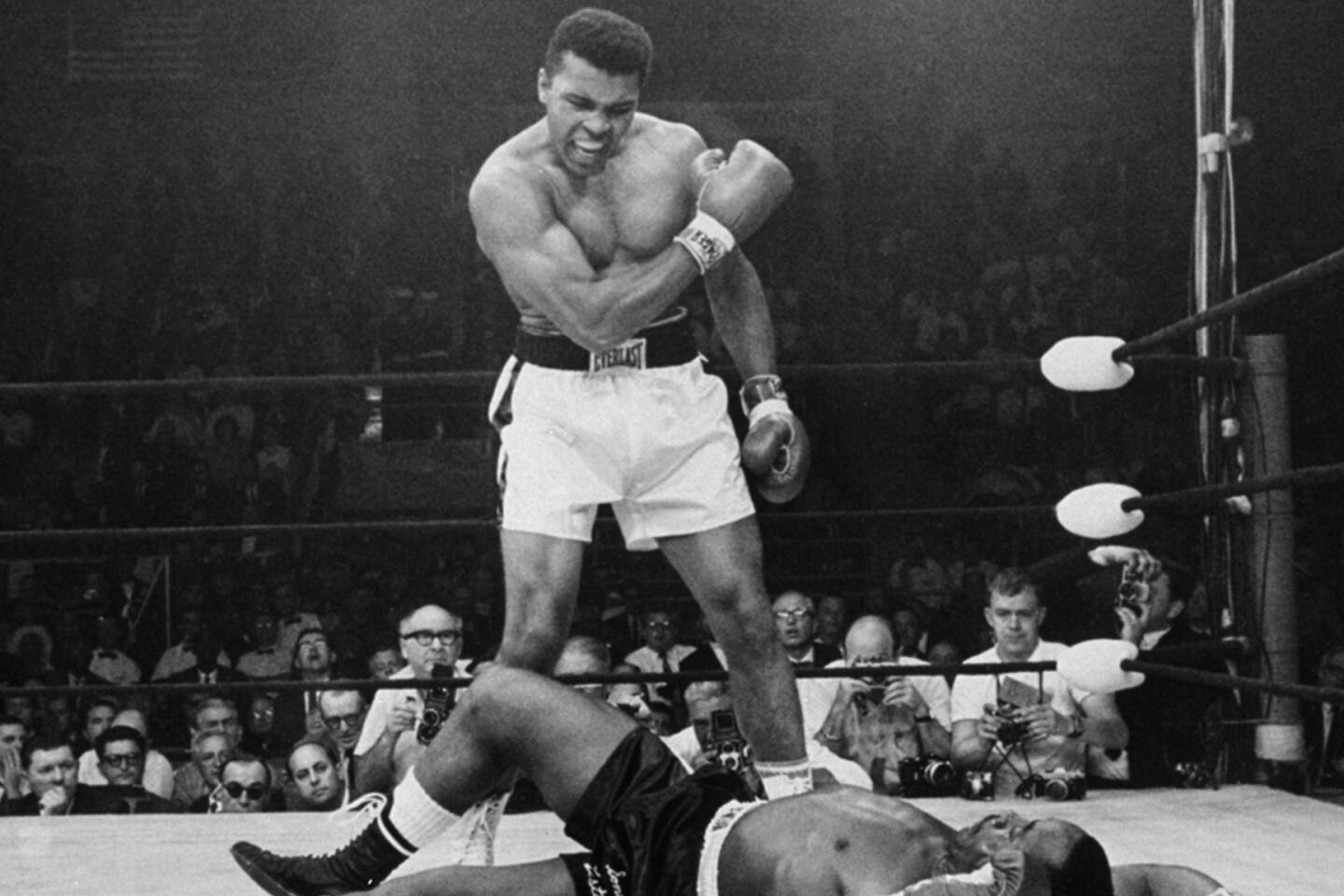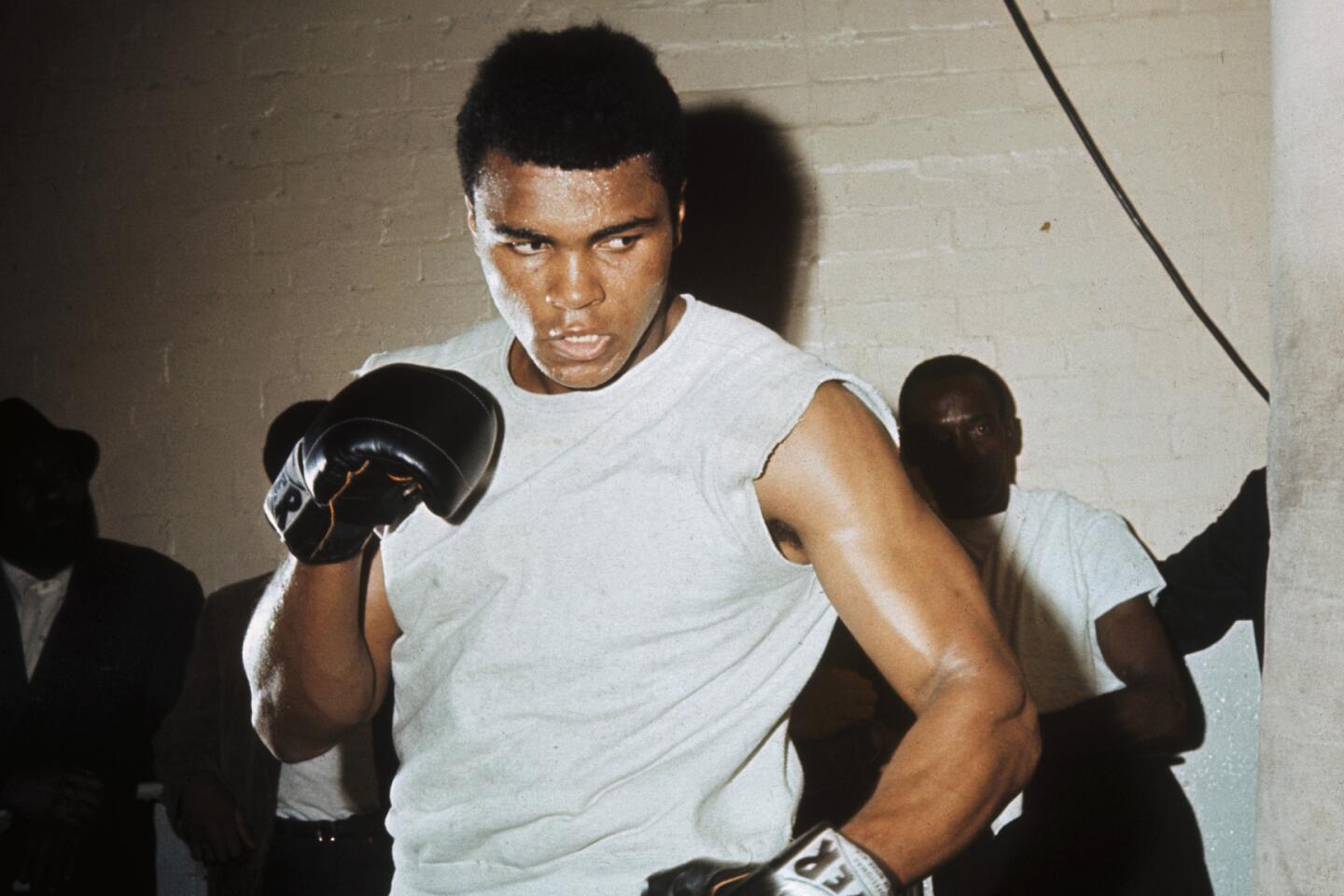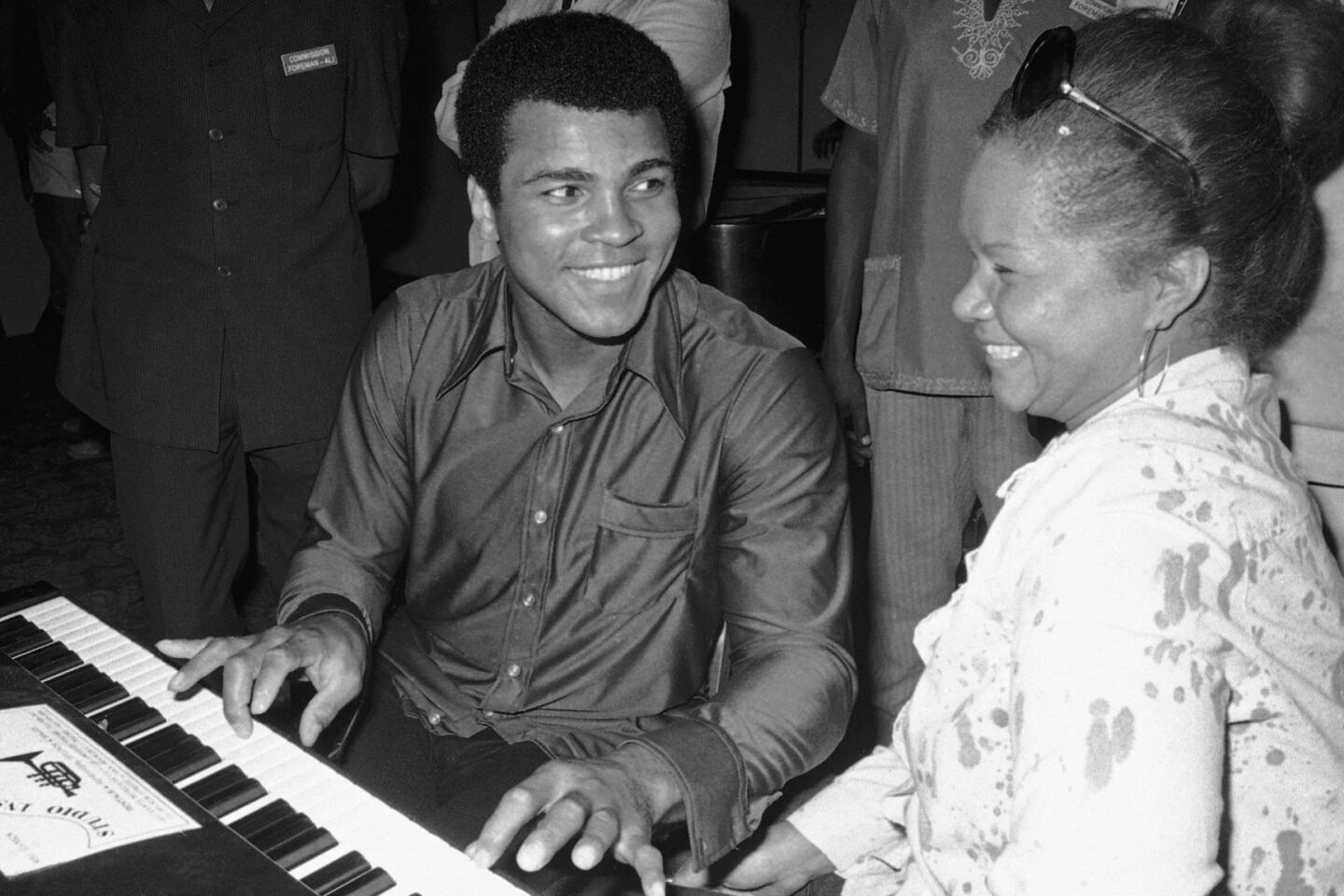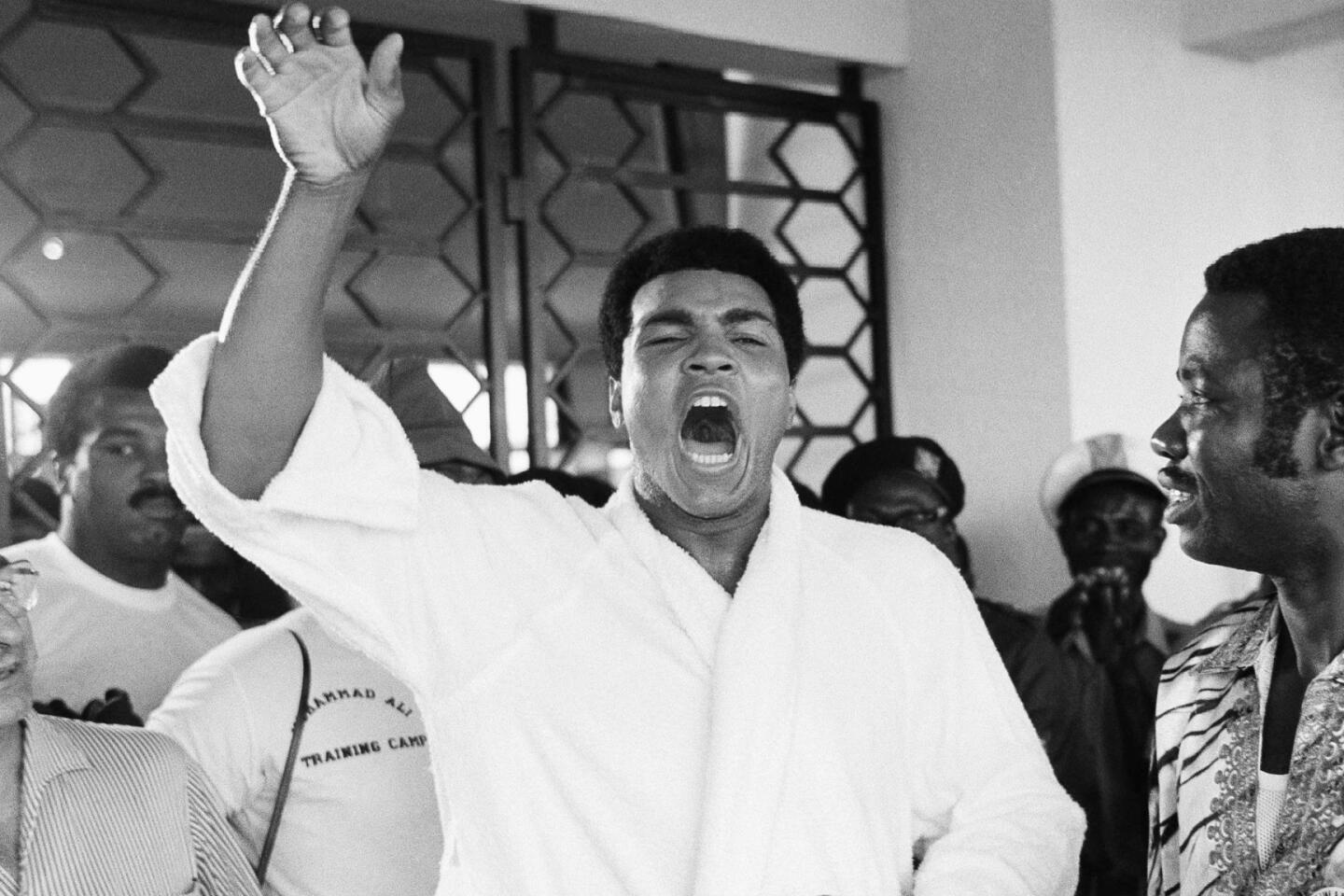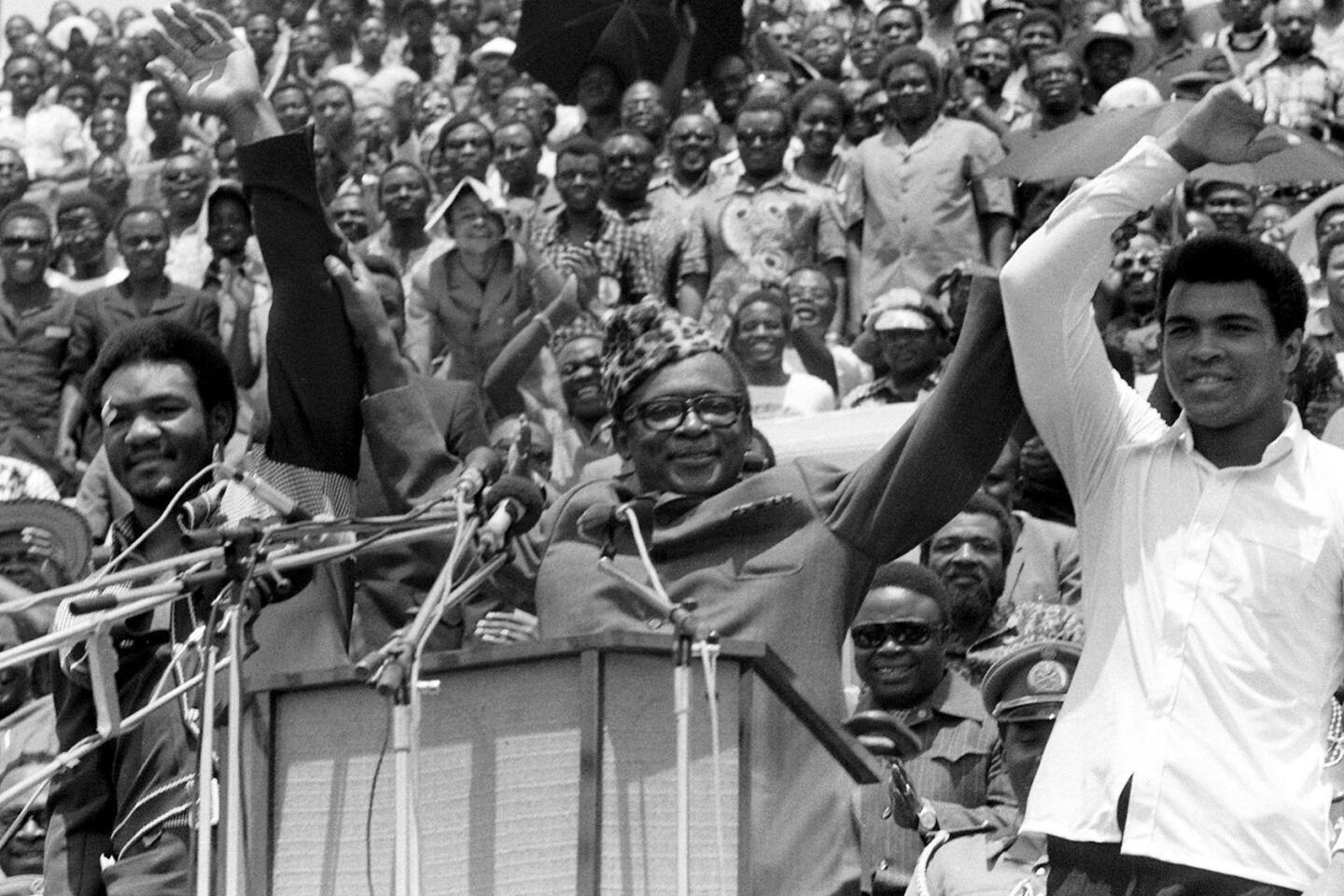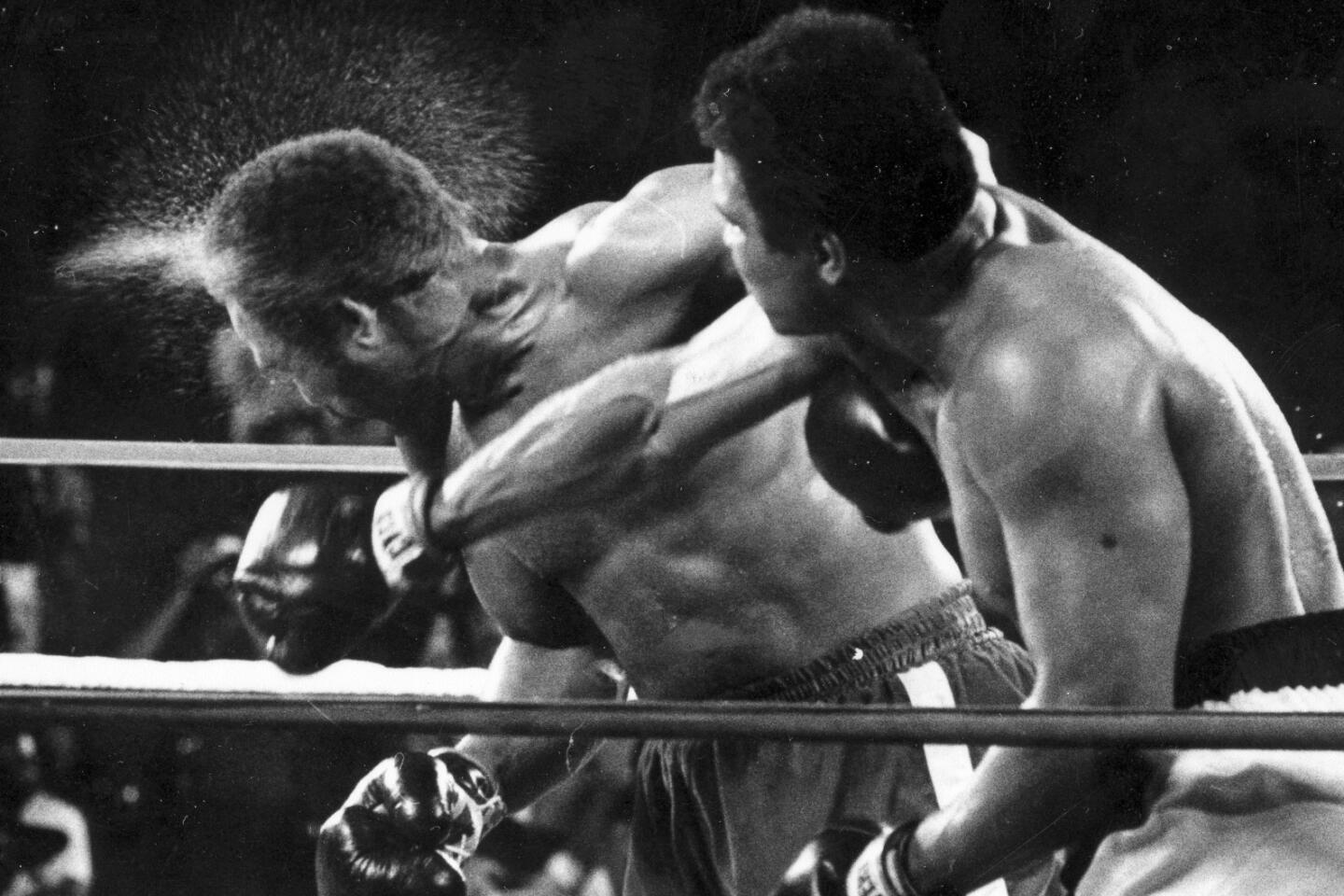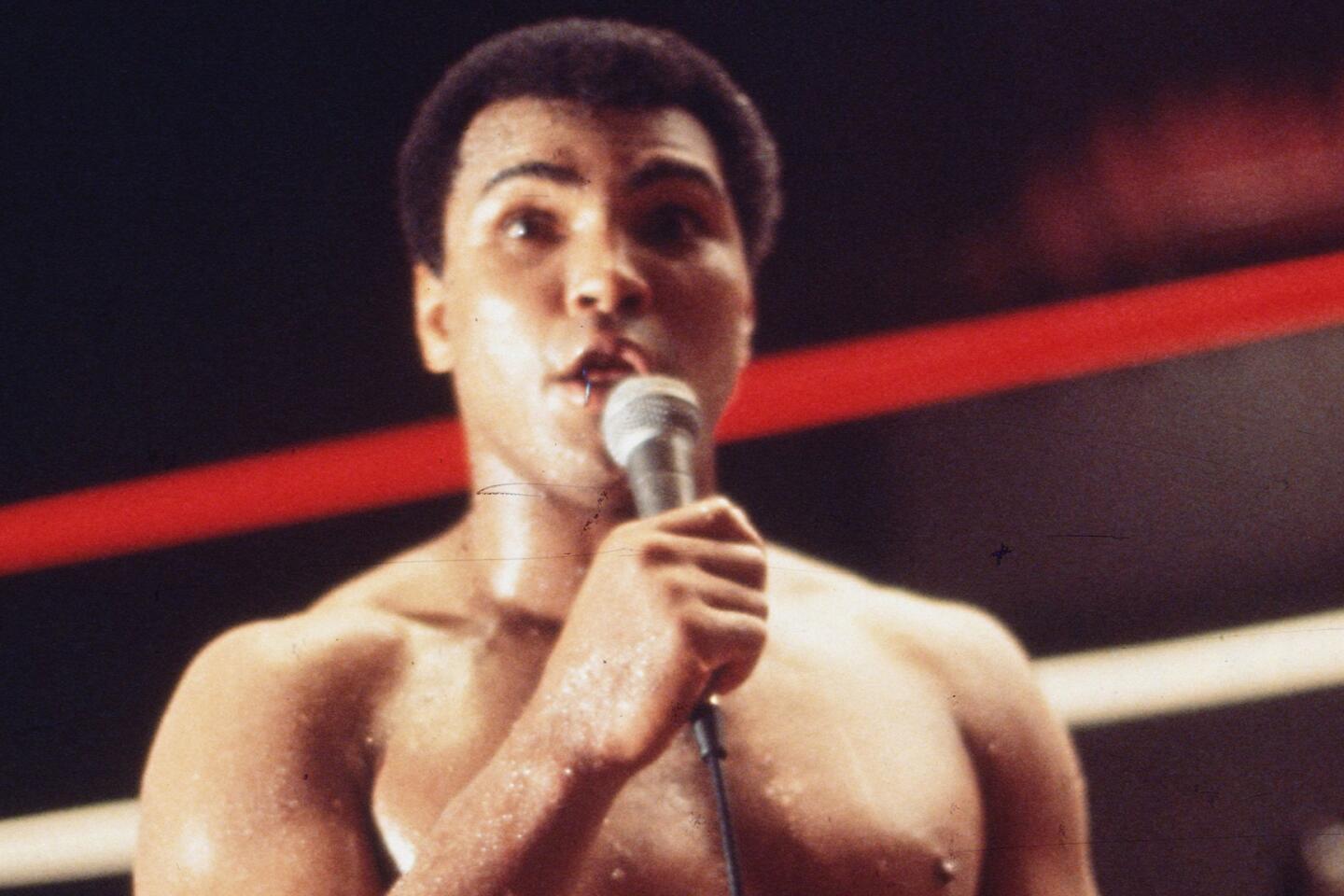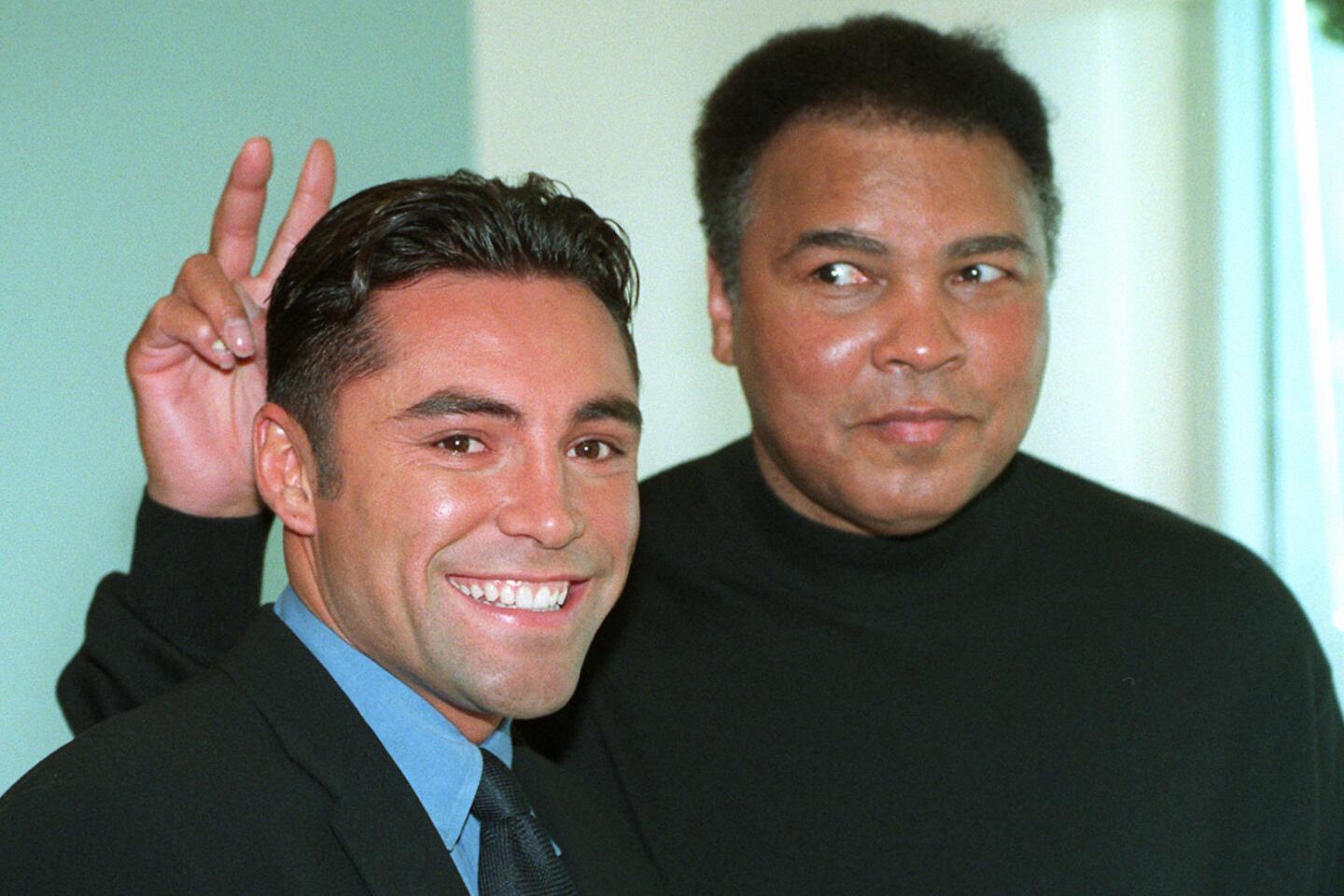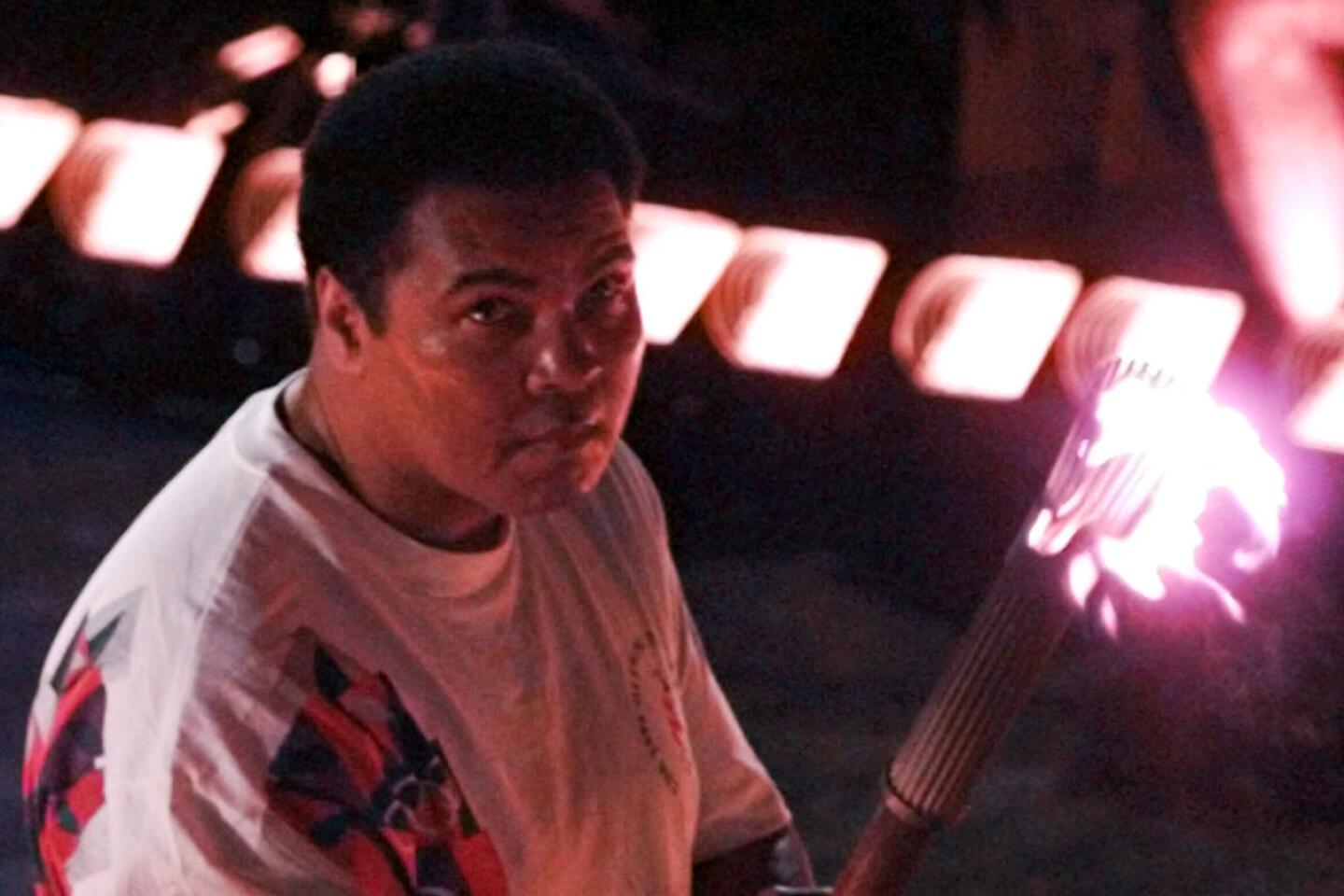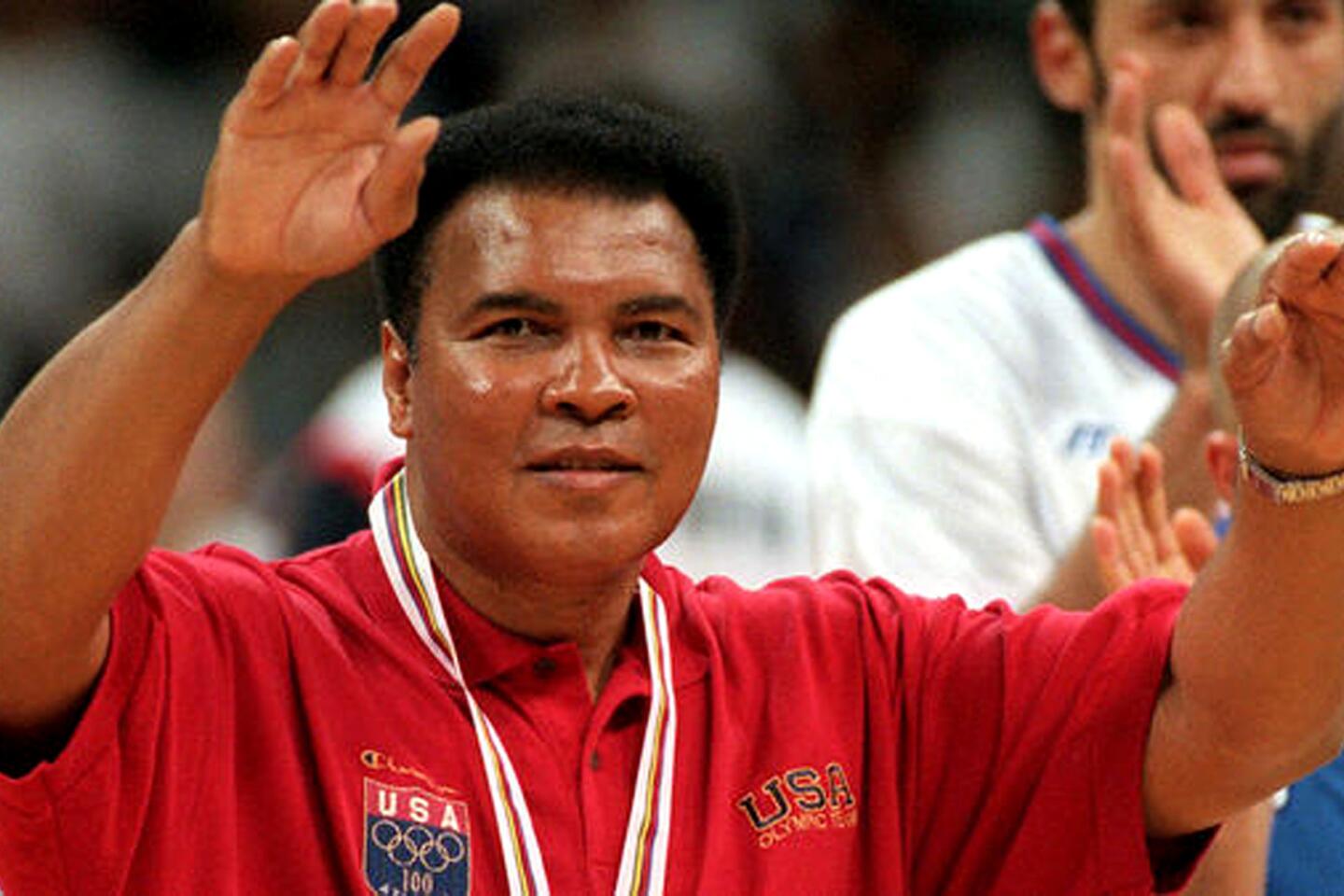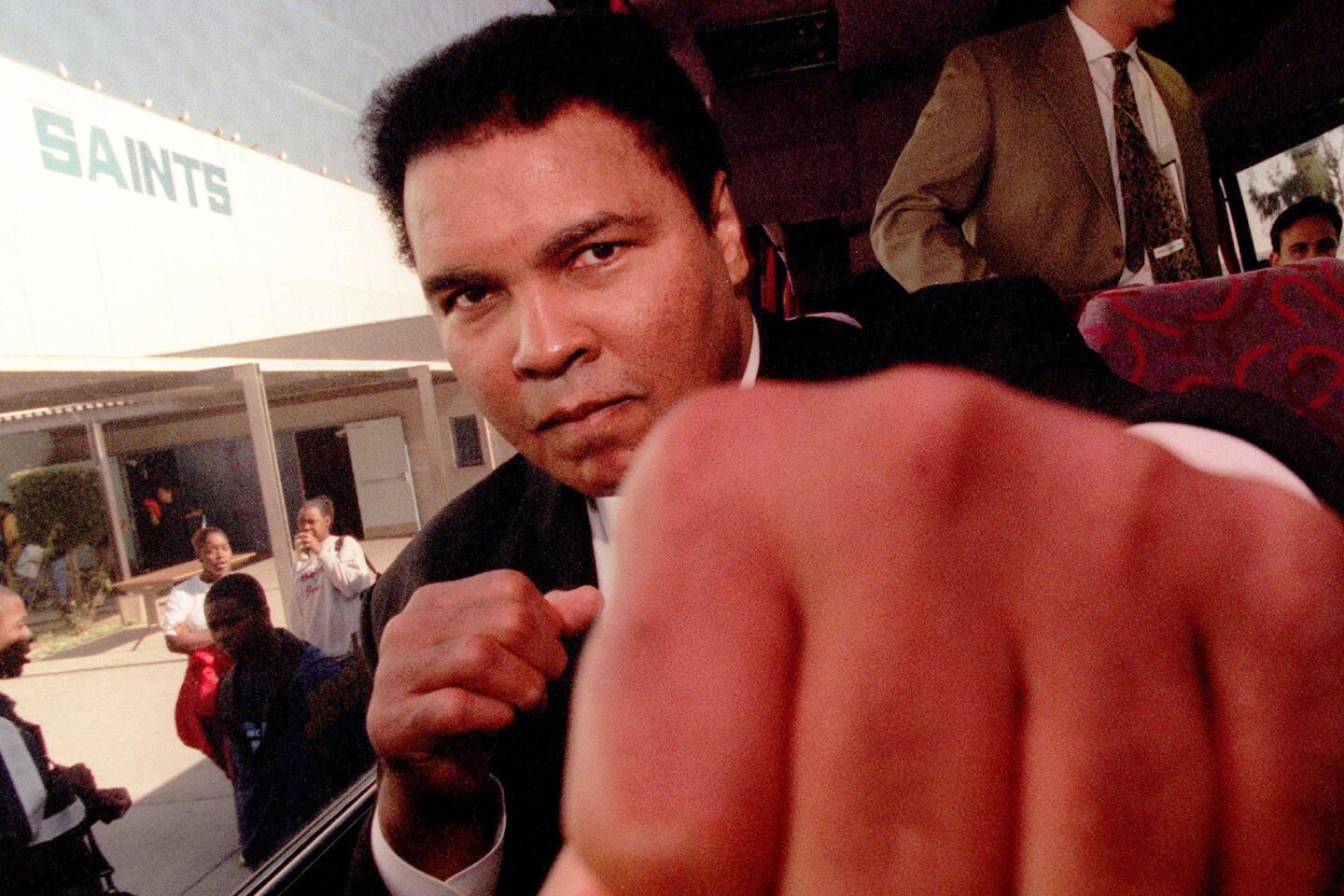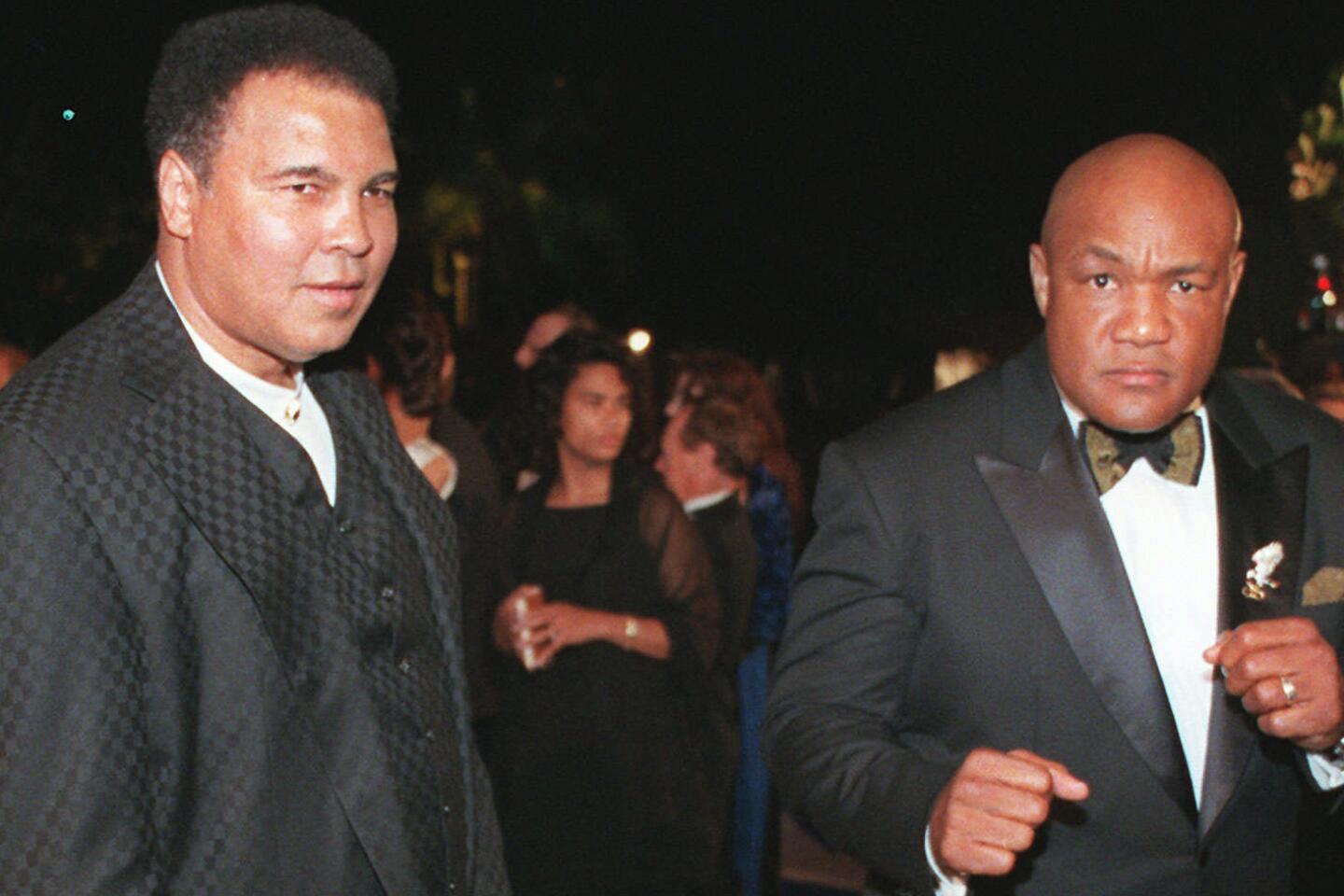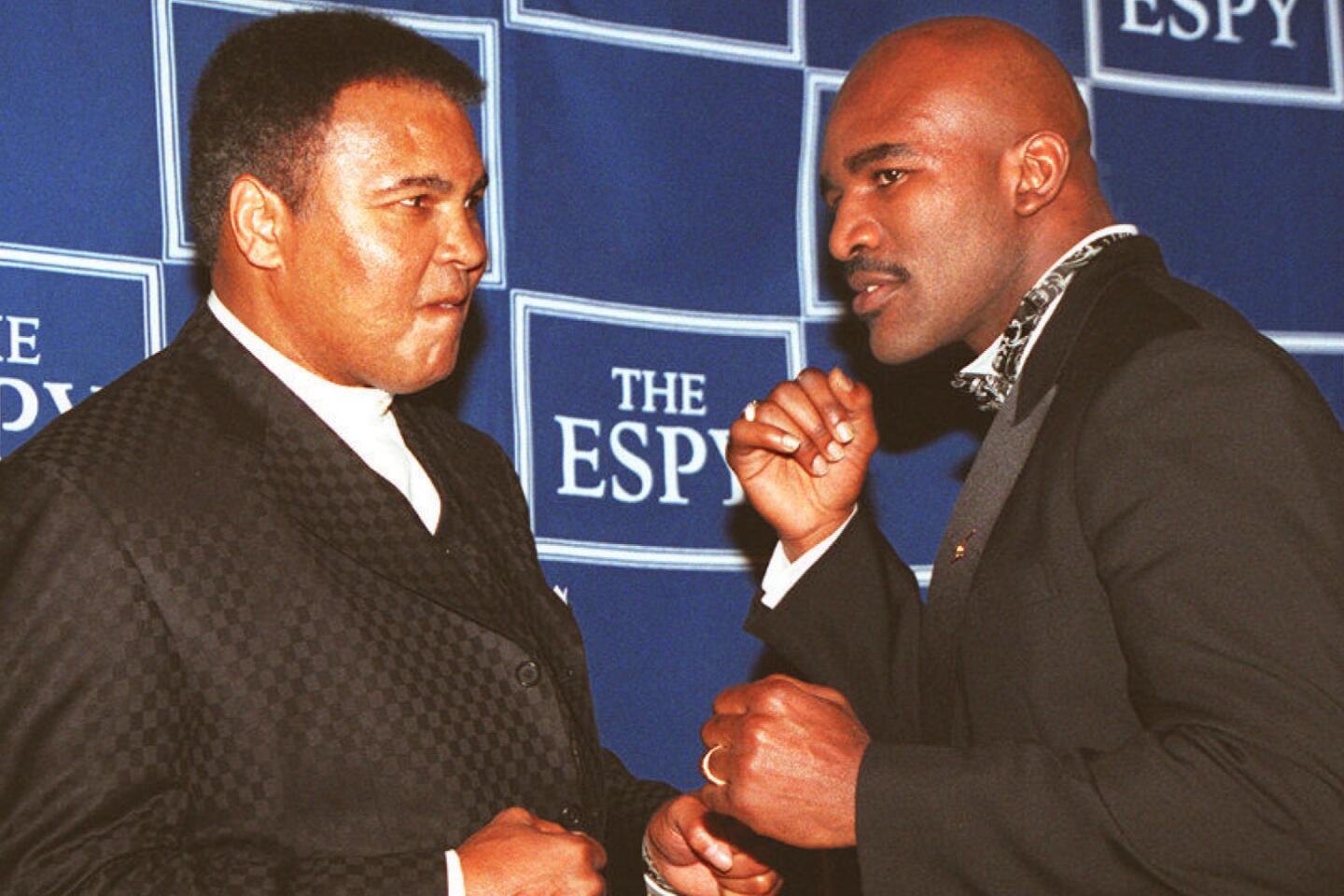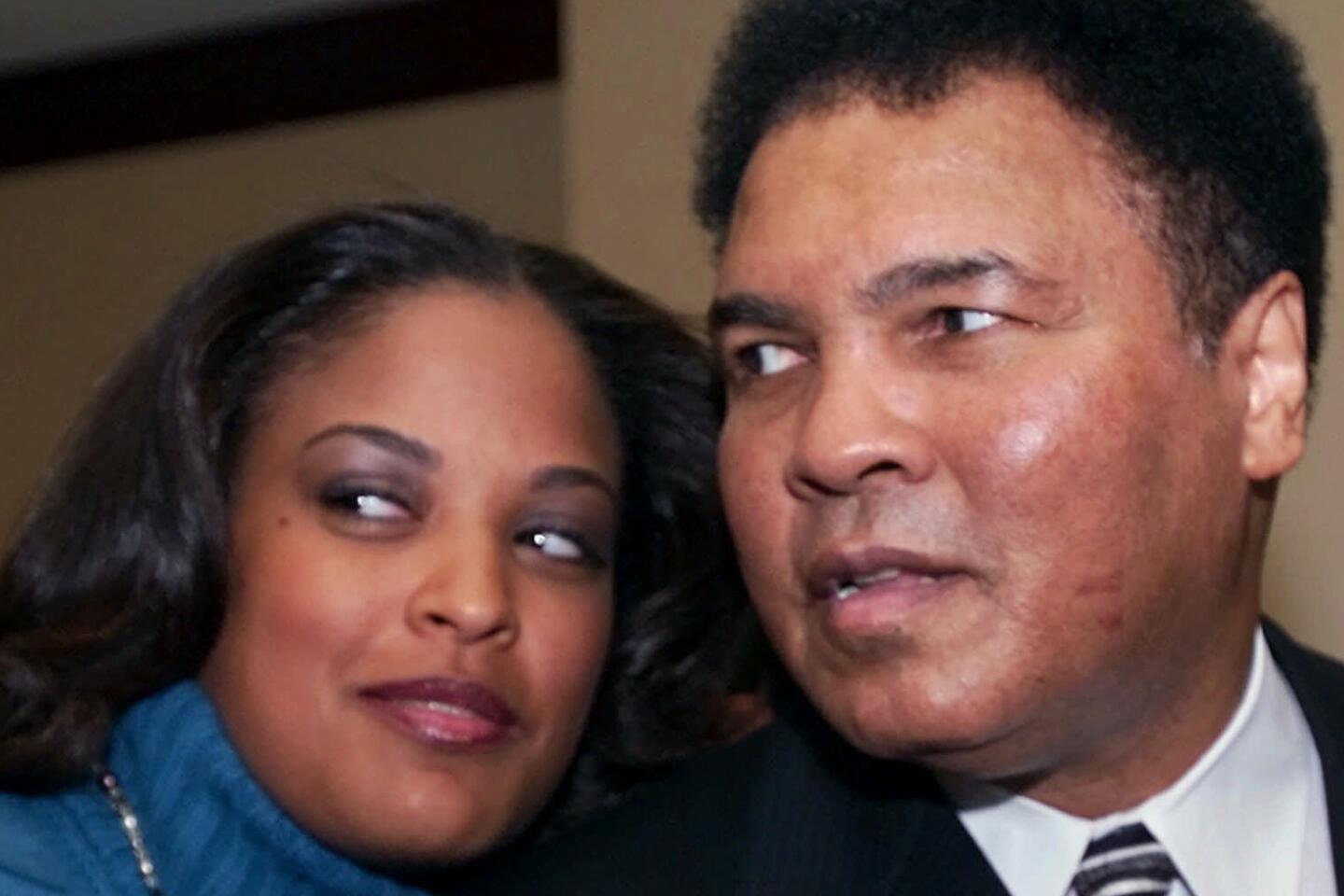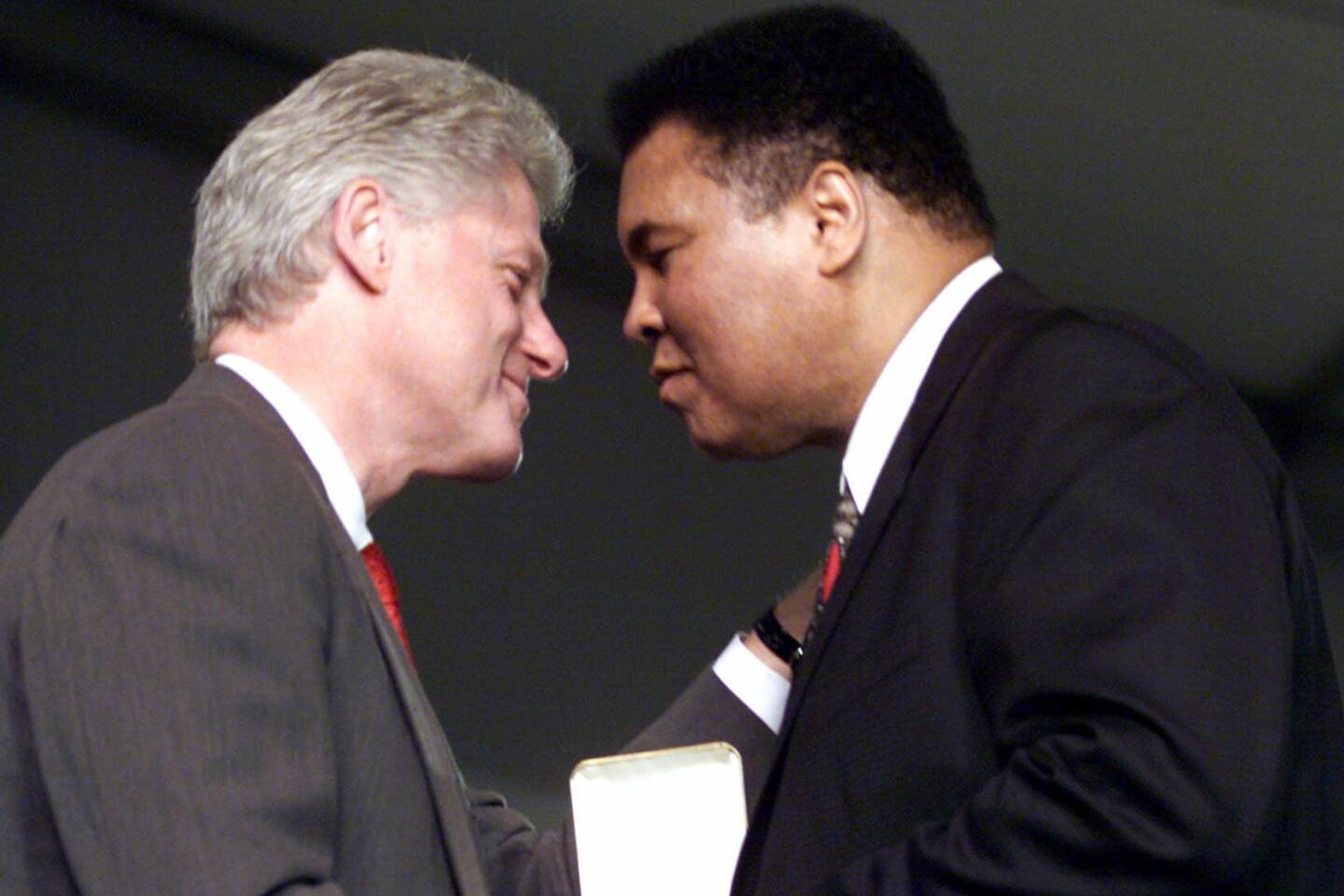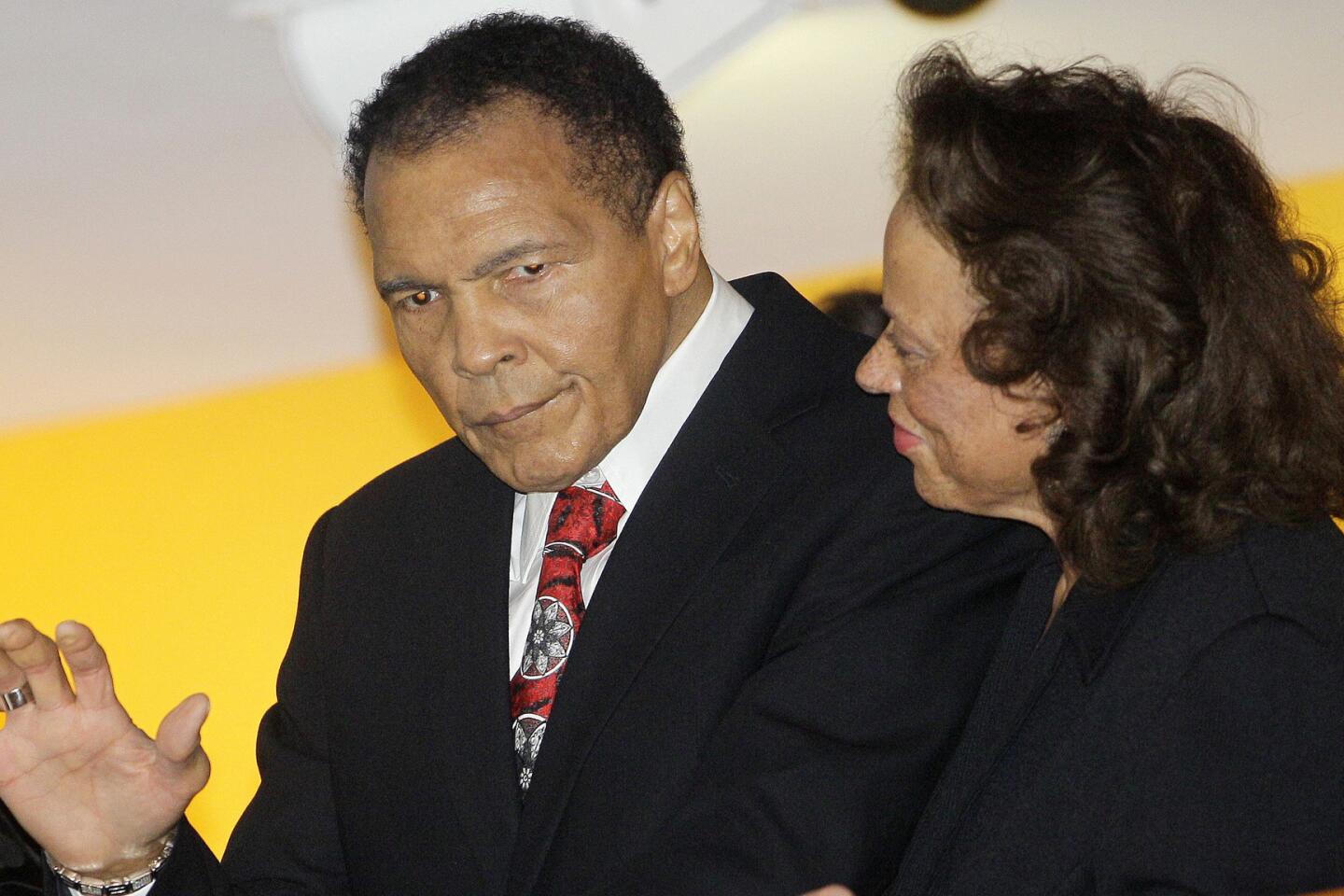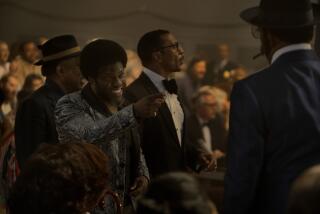To Muslims the world over, Muhammad Ali was ‘#TheGreatest’
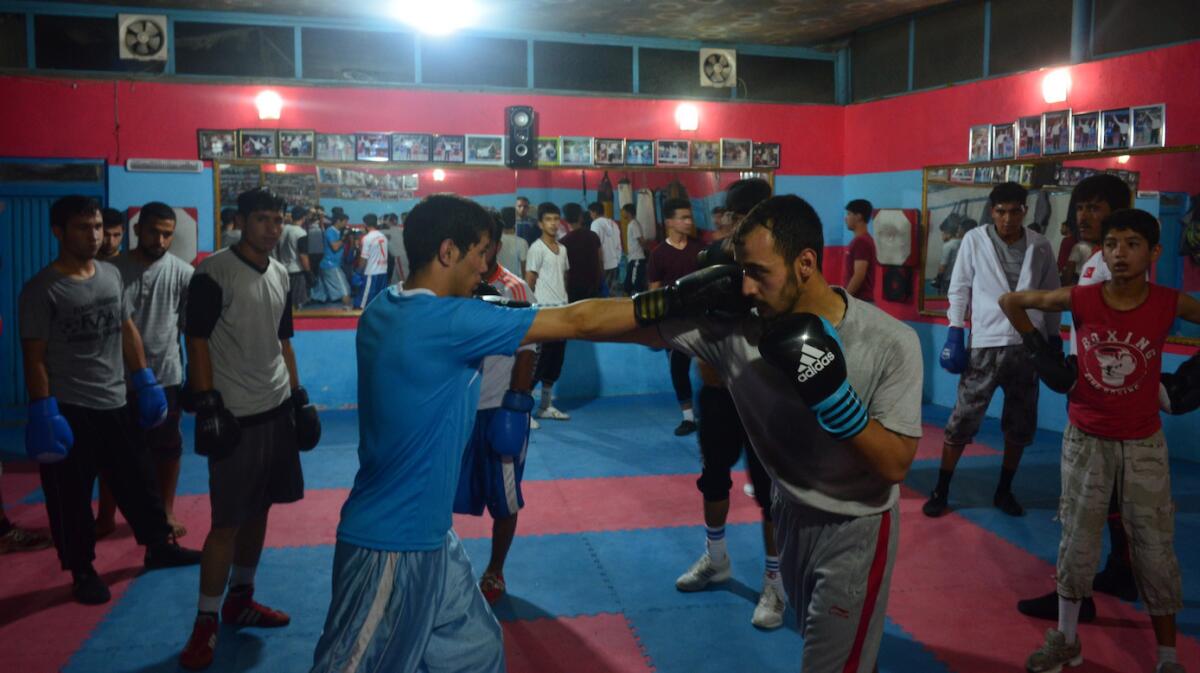
- Share via
Reporting from Kabul — Sitting in the office of a boxing gym on a crowded Kabul street, Hayatullah Osmani listens as his students throw punches, grunting with each hit.
The compact space, painted blue and red with punching bags and tires hanging from the walls, is full of young men, some barely teenagers, learning to throw an uppercut. As they practice, Osmani, 32, recalls the first time he heard of Muhammad Ali.
He was 9, and his brother, who also had boxed, told him about a black Muslim boxer who had come to be known as “the greatest.”
“He was an unparalleled boxer, of course, but he was also a good person,” Osmani said. “He stood up for his people, for his beliefs.”
It was that defiant devotion to Islam and peaceful spirit that made the fighter a hero to Muslims around the world. He was mourned Saturday not as some remote American figure, but as one of their own.
At a time of Muhammads inspiring distrust and fear, this Muhammad inspires millions.
— Mohammed Hariri, Jordanian doctor
“Every athlete in Afghanistan knows the name Muhammad Ali,” said Osmani, who when he started boxing watched the master’s matches and studied his moves.
But no one here could have imagined they would come face-to-face with “the people’s champion” in Kabul in 2002, just a year after the fall of the Taliban. Even at 60 and suffering from Parkinson’s syndrome, Ali remained as captivating as ever.
“When he would look at you, dead in the eye, there was something wild in his face,” Osmani recalled.
For Shah Wali, a trainer at Osmani’s gym, and for millions of other Muslims, Ali represented a seeming impossibility: a Muslim man born and raised in the West who became not only a sporting legend, but a cultural icon.
As a child, Shah Wali was shocked to learn that Ali had started out life as Cassius Clay.
“Until then I respected him as a fighter who managed to captivate everyone with his skill and his sharp tongue, but finding out he had converted to Islam and changed his name publicly, that only made me respect him that much more,” he said.
With Islamophobia spreading in many Western nations, including the United States, Ali’s life as an unapologetic adherent of Islam won the admiration of Muslims.
“At a time of Muhammads inspiring distrust and fear, this Muhammad inspires millions,” said Mohammed Hariri, a Jordanian doctor.
Sayyid Syeed, president of the Islamic Society of North America, said Ali served as a “bridge between African American Muslims and the Muslims who came from all over the world.”
Ali -- or Muhammad Ali Clay, as he was known in the Arab world to avoid confusion with the Egyptian Khedive Muhammad Ali Pasha -- achieved iconic status in the Middle East because of his accomplishments outside, as well as inside, the ring.
“He was not just the Pele of the boxing ring, but also its Toussaint L’Ouverture, its Mahmoud Darwish, its Mother Teresa and its George Clooney,” said Mouin Rabbani, a political expert in Jordan.
“Ali erupted onto the world stage not just in the context of the American civil rights movement and the war in Vietnam, but at a time when struggles against inequality, injustice and foreign domination were seen and experienced as inextricably linked globally,” he said.
“That he embraced Islam, explicitly referenced his faith as the basis for his actions, and engaged with the region and the aspirations of its peoples helped catapult him to superhero status.”
Khaled Montasser, an Egyptian dermatology professor, was a teenager when Clay became a member of the Nation of Islam in 1964 and a few weeks later adopted his new name.
“This was a time when the U.S. had one of its least popular presidents as far as Egyptians were concerned: President Lyndon B. Johnson,” he said. “By going against his government’s policies, becoming a Muslim, refusing to go to war, and risking jail and the loss of his titles, it was as if Ali had challenged Johnson himself.”
Though Ali’s early fights were not broadcast live in the Middle East, fans would crowd cinemas to see footage of the bouts.
“The crowds [at the screenings] were unbelievable,’’ recalled Khader Musleh, a secular Muslim who grew up in East Jerusalem in the 1960s. “He promoted Islam in a noble way. He showed tolerance, the aspiration for peace, understanding and social justice. He showed that faith in God puts a lot of strength into the body.’’
Mahmoud Shalabia, a retired sports teacher from Gaza City, would watch Ali’s matches at the house of a friend because his family could not afford a television.
“He was not an ordinary boxer,’’ Shalabia said. “I’m proud of him as a Muslim who fought against terrorism and extremism, and who has always been a model of a great Muslim.”
There weren’t many Muslims of his stature.... It was like Obama becoming president.
— Sheikh Kamal Rayan
At the time, Ali’s appeal marked a rare point of consensus among Arabs.
“Conservative Muslims loved that he became a Muslim, and people on the left loved that he defied the establishment,’’ said Munther Dajani, a professor of political science at Al Quds University in East Jerusalem.
A picture of the American boxing legend still hangs in the university’s American Studies Department, alongside images of Martin Luther King Jr. and the U.S. Constitution.
Daoud Kuttab remembered how, as a young Palestinian journalist in East Jerusalem, he ended up meeting Ali in 1985.
------------
For the record
2:29 p.m., June 5: A previous version of this article erroneously stated that Kuttab met Ali in 1979. It was 1985.
------------
Hoping for an interview, Kuttab located Ali’s entourage at the King David Hotel. But before he could get in a question, one of Ali’s aides asked Kuttab if he could recommend a nearby mosque for Friday prayers.
“I said, ‘You’re in Jerusalem, why would you go to a dinky mosque? You must go to Al Aqsa,’” recalled Kuttab, a Christian Arab who drove Ali to the third holiest site in Islam in a Fiat that was nearly too small for the towering athlete.
The unplanned visit allowed Ali to attend noon prayers undisturbed. But as the group emerged from the mosque in the Old City of Jerusalem, a crush of fans was waiting.
For the rest of the afternoon, Kuttab and the American champion tried to keep ahead of the crowds.
First they escaped into the African section of the Old City’s Muslim Quarter, where guests at a wedding insisted he meet the bride and groom. Then they visited a restaurant in downtown East Jerusalem and posed for a picture with a local boxing champion.
But outside in the street, another crush of people was waiting.
“The whole thing was surreal. I’ve never seen anyone inspire as much excitement as Mohammed Ali did,” Kuttab said. “That was the best proof” of what he meant to Arabs.
The American champion was held up as paragon for emulation in mosques as well as in the Arab street. Neighborhood imams would invoke his sayings in sermons and cite him as a person of faith and principle.
“There weren’t many Muslims of his stature,” said Sheikh Kamal Rayan, who grew up in the Israeli Arab village of Bar’a. “It was like Obama becoming president.”
The renowned Saudi Arabian scholar Mohammed Arefer tweeted to his 15 million followers an old video clip of the boxer quoting the Koran in an interview.
“Allah, please treat him with your kindness and goodness,” said the scholar.
Ali’s death elicited a flood of tributes across the Muslim world.
Jordan’s King Abdullah II called the boxer “the hero of a generation and a legend of our time.”
Bangladesh’s President Abdul Hamid described him as the greatest boxer of all time.
“#TheGreatest in the ring and in the fight for justice, dignity and peace,” Iranian Foreign Minister Javad Zarif said in a post on his Twitter account.
“A shining example of defying the odds with perseverance and a positive attitude,” added Pakistan’s Prime Minister Nawaz Sharif.
Raees Ansari, a Pakistani journalist, vividly remembered Ali’s three-day visit to Lahore in 1987, during which the boxing champ visited Data Darbar, a legendary Sufi Muslim shrine.
“He showed great interest in religion” and also seemed to enjoy Pakistani food, he said.
Ansari, who met Ali several times, recalled a visit to a school where Ali sparred with students and pretended to be defeated.
“I found him such a pleasant person,” Ansari said.
Ramzan Kadyrov, the Kremlin-backed ruler of Chechnya known for his amateur boxing fights and criticized by human rights groups for his heavy-handed rule, said he would name a street in the capital, Grozny, after Ali.
“A true Muslim has left this sinful world,” Kadyrov said in a message posted on Instagram, adding, “Thanks to him, I became a boxer, created conditions for thousands of boys to take up boxing.”
Rauf Garayev, a professional boxer from Tatarstan, a Russian region with a significant Muslim population, said the timing of Ali’s demise, days before the start of the holy month of Ramadan, was a blessing.
“Allah has tested Ali for many years the way he does with his favorite sons,” he said, “and he took him during these holy days.”
ALSO
On California’s death row, too insane to execute
Quick action by professors kept UCLA gunman from escaping
Heat-fuled brush fires hit Southern Calif.; parts of Calabasas evacuated
Special correspondents Latifi reported from Kabul, Mitnick from Jerusalem and Bulos from Amman, Jordan. Special correspondents Omar El Adl in Cairo, Aoun Abbas Sah in Islamabad, Mansur Mirovalev in Moscow, Rushdi Abu Alouf in Gaza City and Mohiuddin Kader in Dhaka, Bangladesh, contributed with Times staff writers Alexandra Zavis in Los Angeles, Tracy Wilkinson in Washington and Nigel Duara in Scottsdale, Ariz.
More to Read
Sign up for Essential California
The most important California stories and recommendations in your inbox every morning.
You may occasionally receive promotional content from the Los Angeles Times.
